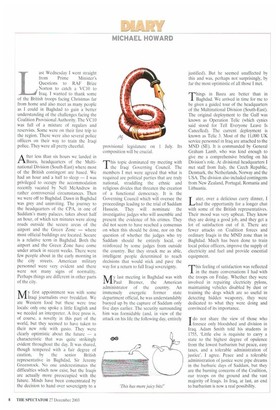L ast Wednesday I went straight
from Prime Minister's Questions to RAF Brize Norton to catch a VC10 to Iraq. I wanted to thank some of the British troops facing Christmas far from home and also meet as many people as I could in Baghdad to gain a better understanding of the challenges facing the Coalition Provisional Authority. The VC10 was full of a mixture of regulars and reservists. Some were on their first trip to the region. There were also several police officers on their way to train the Iraqi police. They were all pretty cheerful.
After less than six hours we landed in Basra, headquarters of the Multinational Division (South-East) where most of the British contingent are based. We had an hour and a half to sleep — I was privileged to occupy the accommodation recently vacated by Nell McAndrew in rather controversial circumstances. Then we were off to Baghdad. Dawn in Baghdad was grey and uninviting. The journey to the headquarters of the CPA, in one of Saddam's many palaces, takes about half an hour, of which ten minutes were along roads outside the secure areas of the airport and the Green Zone — where most official buildings are located. Secure is a relative term in Baghdad. Both the airport and the Green Zone have come under attack in recent weeks. There were few people about in the early morning in the city streets. American military personnel were very evident and there were not many signs of normality. Perhaps things are different in other parts of the city.
My first appointment was with some Iraqi journalists over breakfast. We ate Western food but these were true locals: only one spoke a little English and we needed an interpreter. A free press is, of course, a novelty in this part of the world, but they seemed to have taken to their new role with gusto. They were
clearly optimistic about the future a characteristic that was quite strikingly evident throughout the day. It was shared, though tempered with a fair degree of caution, by the senior British representative in Baghdad, Sir Jeremy Greenstock. No one underestimates the difficulties which now exist, but the Iraqis are actually more preoccupied with the future. Minds have been concentrated by the decision to hand over sovereignty to a provisional legislature on 1 July. Its composition will be crucial.
This topic dominated my meeting with 1 the Iraqi Governing Council. The members I met were agreed that what is required are political parties that are truly national, straddling the ethnic and religious divides that threaten the creation of a functional democracy. It is the Governing Council which will oversee the proceedings leading to the trial of Saddam Hussein. They will nominate the investigative judges who will assemble and present the evidence of his crimes. They did not seem to have reached a consensus on when this should be done, nor on the question of whether the judges who try Saddam should be entirely local, or reinforced by some judges from outside the country. But they struck me as able, intelligent people determined to reach decisions that would stick and pave the way for a return to full Iraqi sovereignty.
My last meeting in Baghdad was with Paul Bremer, the American administrator of the country. An immensely energetic former state department official, he was understandably buoyed up by the capture of Saddam only five days earlier. The security surrounding him was formidable (and, in view of the attack on his life the following day. entirely
justified). But he seemed unaffected by this and was, perhaps not surprisingly, by far the most optimistic of all those I met.
Things in Basra are better than in Baghdad. We arrived in time for me to be given a guided tour of the headquarters of the Multinational Division (South-East). The original deployment to the Gulf was known as Operation Telic (which cynics said stood for Tell Everyone Leave Is Cancelled). The current deployment is known as Telic 3. Most of the 11,000 UK service personnel in Iraq are attached to the MND (SE). It is commanded by General Graham Lamb, who was kind enough to give me a comprehensive briefing on his Division's role. At divisional headquarters I met staff from Italy, the Czech Republic, Denmark, the Netherlands, Norway and the USA. The division also included contingents from New Zealand, Portugal, Romania and Lithuania.
Later, over a delicious curry dinner, I had the opportunity for a longer chat with some of the British representatives. Their mood was very upbeat. They know they are doing a good job, and they get a lot of satisfaction out of it. There are fewer attacks on Coalition forces and ordinary Iraqis in the MND zone than in Baghdad. Much has been done to train local police officers, improve the supply of electricity and fuel and provide essential equipment.
This feeling of satisfaction was reflected in the many conversations I had with the troops on Friday. Whether they were involved in repairing electricity pylons, maintaining vehicles disabled by dust or training the dogs which are so useful in detecting hidden weaponry, they were dedicated to what they were doing and convinced of its importance.
Ido not share the view of those who foresee only bloodshed and division in Iraq. Adam Smith told his students in 1755, 'Little else is requisite to carry a state to the highest degree of opulence from the lowest barbarism but peace, easy taxes, and a tolerable administration of justice'. I agree. Peace and a tolerable administration of justice were pipe dreams in the barbaric days of Saddam, but they are the burning concerns of the Coalition, our troops on the ground and the vast majority of Iraqis. In Iraq, at last, an end to barbarism is now a real possibility.


























































 Previous page
Previous page